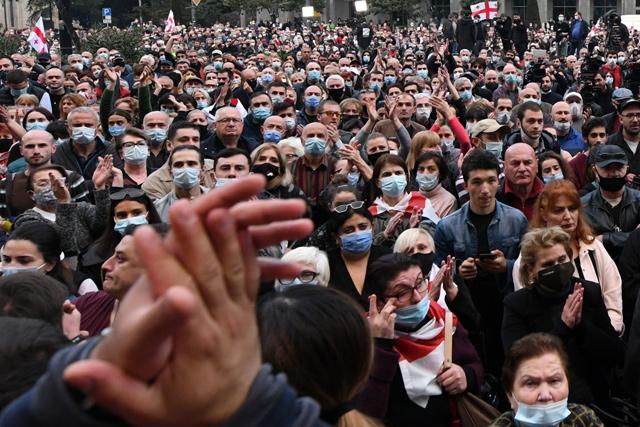- International News
- Mon-2020-11-02 | 03:24 pm

Nayrouz News Agency :
Georgia’s opposition called on Sunday for mass protests after the ruling Georgian Dream Party claimed victory in a tightly contested parliamentary election.
Exiled ex-president and opposition leader Mikheil Saakashvili accused Georgian Dream of falsifying Saturday’s vote and urged his supporters to take to the streets.
The vote could spark another political crisis in the ex-Soviet republic of four million, where elections are often followed by accusations of fraud and mass demonstrations.
Saakashvili’s United National Movement Party (UNM) was already calling for a protest rally Sunday afternoon outside parliament.
Independent local election observers said there had been multiple irregularities.
International monitors from the Organisation for Security and Cooperation in Europe and the NATO Parliamentary Assembly said in a joint statement that the elections "were competitive and, overall, fundamental freedoms were respected”.
However, they also described the elections as "far from flawless” and marred by "pervasive allegations of pressure on voters... and blurring of the line between the ruling party and the State”.
It was unclear whether the opposition would be able to mobilise large numbers of supporters, with many Georgians weary of political instability and worried by the coronavirus pandemic.
With votes from nearly 92 per cent of precincts counted, Georgian Dream had won 48 per cent of the proportional vote, against 45.5 per cent for opposition parties, the Central Election Commission said.
The proportional vote decides 120 of the 150 seats in the legislature.
Georgian Dream’s leader, billionaire ex-prime minister Bidzina Ivanishvili, said his party "has won elections for the third time in a row.
"Georgians have elected a great team,” he said.
But Saakashvili, a charismatic reformer who led Georgia from 2004 to 2013, accused the ruling party of "massively falsifying election results” and announced a "mass mobilisation to defend votes”.
Georgia became a darling of the West after Saakashvili came to power in the 2003 Rose Revolution and instituted reforms to boost democratic institutions and battle corruption.
But a 2008 war with Russia and political infighting has dimmed hopes of the country joining NATO and the European Union.
Georgian Dream — widely seen as a vehicle for Ivanishvili’s political ambitions — emerged in 2012 and has since dominated the country’s politics.
Georgia remains one of the most pluralistic countries to emerge from the 1991 collapse of the Soviet Union, although concerns have been growing that it is backsliding on democracy.
Independent local election observers also criticised Saturday’s vote.
The polls "marked a setback of Georgia’s democracy,” the Georgian branch of Transparency International said in a statement.
Tbilisi-based election watchdog GYLA said "election day was marred by... serious violations”.
In an unprecedented show of unity months ahead of the vote, Saakashvili’s UNM Party and smaller opposition groups joined forces to challenge Georgian Dream.
They had held talks on forming a coalition government if elected.
With another 30 seats to be assigned in single-mandate constituencies requiring up to two rounds of voting, the final makeup of the new parliament may only become clear in late November.
Saakashvili was forced to flee Georgia at the end of his second term as president in 2013, fearing arrest after prosecutors accused him of abusing power — charges he has denied.
Western capitals have accused the Georgian Dream-led government of mounting a political witch-hunt against the ex-president and his allies.
Critics accuse Ivanishvili of persecuting political opponents and creating a corrupt system in which private interests dominate politics.
Tbilisi-based analyst Gela Vasadze said Georgia appeared headed for a period of political uncertainty, even if the opposition fails to bring out big crowds of protesters.
"The coronavirus pandemic will of course scare off many from taking to the streets,” Vasadze said.
"In any case, Georgian Dream will have an extremely shaky majority in the new parliament,” he said, raising the possibility of another snap vote "in the nearest future”













